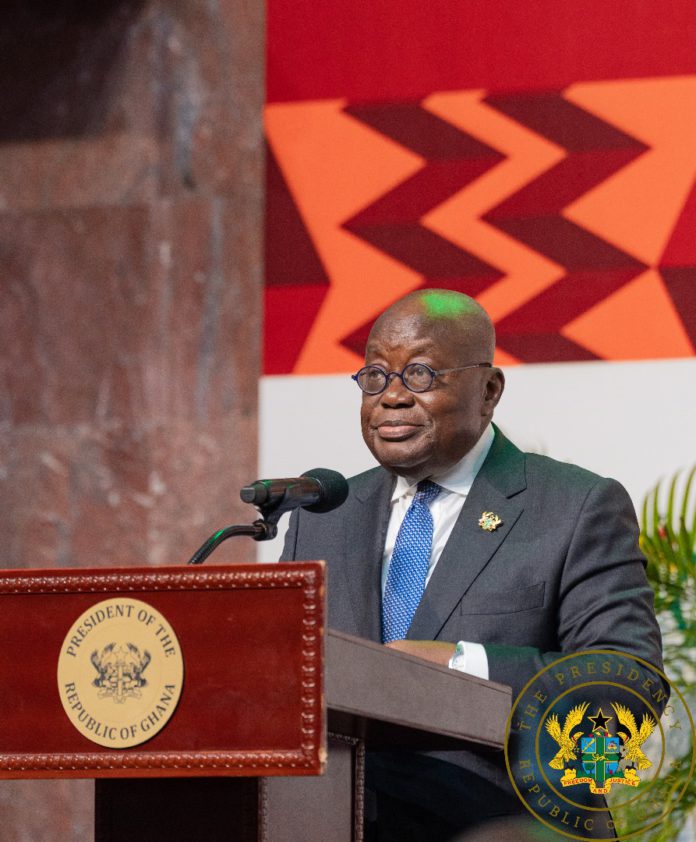President Nana Addo Dankwa Akufo-Addo has challenged Parliaments within the Commonwealth to enact strong legislation to curtail cross-border movement of illegal arms to combat terrorism.
He also urged legislators to propose heavy sanctions to offenders in a bid to stamp the phenomenon out.
“Combating terrorism requires a coordinated effort by all nations and stakeholders.Terrorism and violent extremism remain a phenomenon that threatens our very existence as individuals and collectively as nations,” the President told the 66th Commonwealth Parliamentary Conference (CPC) in Accra yesterday.
The six-day conference, which began last Sunday with workshops, is discussing various topics relating to security, human rights, environment, economy, gender and other cross-cutting issues.
It is being hosted by Ghana’s Parliament under the patronage of the Speaker, Alban Kingsford Sumana Bagbin, who doubles as the President of the Commonwealth Parliamentary Association (CPA).
More than 500 parliamentarians, parliamentary staff and decision-makers from across the Commonwealth are participating.
The conference is on the theme: “The Commonwealth Charter 10 years on: Values and principles for parliaments to uphold.”
Unconstitutional changes
The President expressed worry at the unconstitutional changes in governments in parts of Africa, especially West Africa, through a series of coup d’etats and military interventions.
He said it was in the interest of democratic growth that “these developments are reversed as soon as possible.”
The President called for maximum support for ECOWAS and the African Union (AU) in their efforts to restore democratic institutions to the affected countries of Niger, Mali, Burkina Faso, Guinea and Gabon.
“The Commonwealth should join ECOWAS and the AU in demanding the immediate and unconditional release from unjustifiable detention of the democratically elected President of Niger, Mohammed Bazoum.
“Democracy and stability, which generally accompany democratic governance, are essential for the future prosperity of the African continent,” he said.
Russia-Ukraine war
Touching on the Russia-Ukraine war and the safety of the world, President Akufo-Addo called on world leaders to do all in their power to promote peace between the two countries and find an end to the conflict on the basis of acceptable established principles of international law because it is in everybody’s interest that that was done.
“We must continue to stand firm in our condemnation of all kinds of hegemonic acts, especially of those which seek to subject smaller nations to those of bigger and stronger neighbours,” he stated.
Environment
The President also called on the various parliaments to enact legislation to protect the environment, reduce pollution and promote sustainable practices to cover air, water quality, waste management, afforestation and wildlife conservation.
He said there was a global advocacy towards a transition from fossil fuel to renewable energy resources such as solar, wind and hydro electric and nuclear power.
He urged member countries to invest in renewable energy infrastructure and provide incentive for clean energy production and set renewable targets to reduce carbon emissions and combat climate change.
Tangibility of democracy
On democracy, the President admonished member countries to make democracy tangible through developmental outcomes such as good health care, quality education and affordable housing and create opportunity for individuals to explore and realise their God-given potential.
Speaker
For his part, the Speaker of Parliament, Alban Bagbin, spent time to market Ghana to the outside world.
He re-echoed the fact that Ghana was the leading producer of gold and also a country of peace hinged on a stable democracy over the last 30 years.
The Speaker said effective separation of powers of government might have been achieved by the parliaments of developed countries, but for some parliaments it remained a mirage.
“Yet, democracy will remain elusive if we are not deliberate in our efforts to ensure the independence of parliaments.
”We can strengthen parliaments if we empower our oversight committees to effectively review government actions, budgets and policies,” he said.
Mr Bagbin said parliaments could be strengthened through civic education programmes that informed citizens about their rights and the need to protect parliamentary democracy.
“Indeed, Parliaments must leverage the strong relationships they have with civil society and the media to facilitate public participation in parliament’s work and to expose infractions on democratic principles,” he said.
He said Ghana’s experimentation at parliamentary democracy was now a full-blown feature of its governance architecture.
“This year, we celebrate 30 years of stable parliamentary democracy.
Ours is a stable democracy in a sub-region that has in recent times developed a notoriety for reversing and backsliding on its democratic journey.
“Parliaments in this sub-region and Africa in general must try to understand the reasons for the loss of trust and confidence in the leadership of democratic processes and institutions that has characterised the recent spate of military incursions into governance,” he said.
The Speaker urged countries to be able to pick the signals, should there be any, and steer their democracies away from such incidents.
Majority Leader
The Majority Leader of Parliament and Vice-President of the CPA, Osei Kyei-Mensah-Bonsu, observed that the paradigm in democratic governance had shifted from male domination to effective cross-sectional representation of communities, especially the involvement of females and young persons, as well as the physically challenged.
He said it was time to examine which of the systems was best for effective participation — Is it the first past the post or proportional representation or complimentary appointments by recognised authority — be they kings, presidents or sovereign power?
The Majority Leader asked whether unitary countries should have parliamentary chambers or MPs should have term limits, as well as how to deal with the side effects of winner-takes-all arrangements in presidential and general elections?
He said parliament should be positioned to have oversight responsibility over the executive.
CPA Secretary General
The Secretary General of the CPA, Stephen Twigg, noted that the CPA had made significant progress with best democratic practices among member countries.
He said the association had for the last few years encouraged and supported member countries to embark on democratic reforms to improve best practices of democratic values and principles.
ALSO READ:

